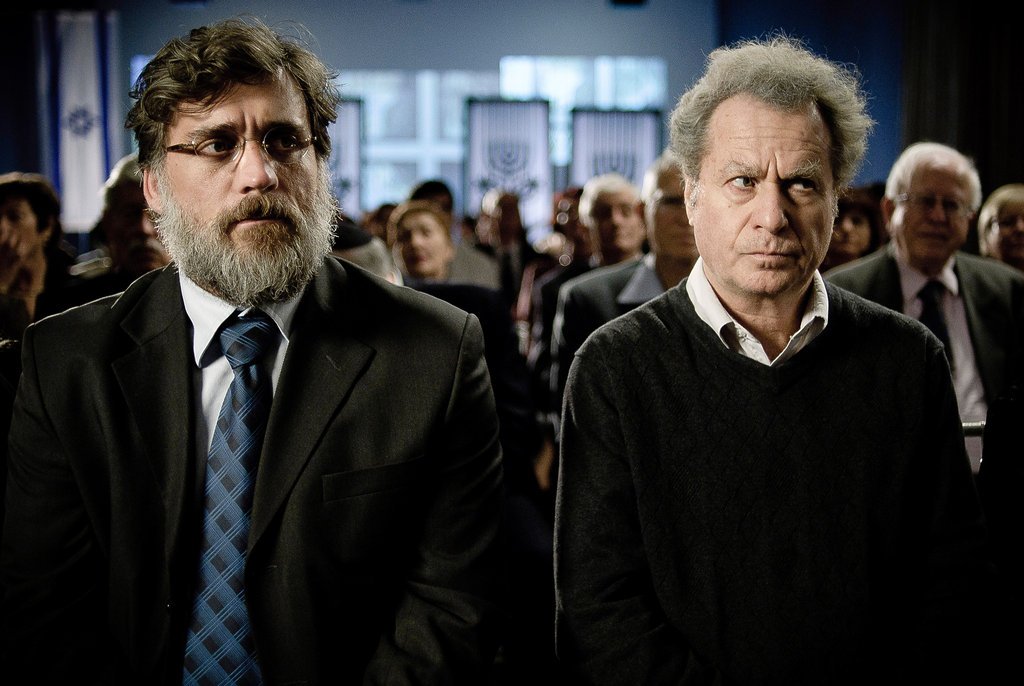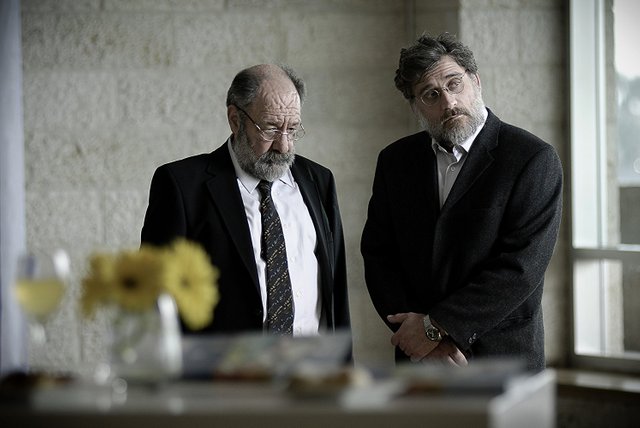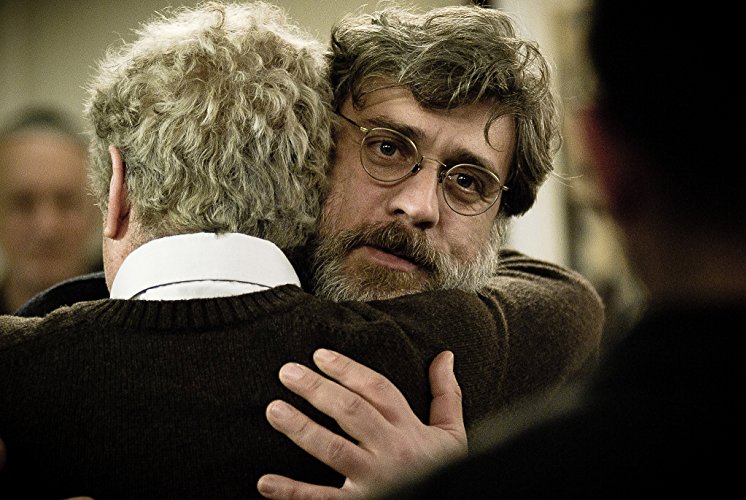
Footnote was among the five finalists for the 2012 Academy Awards for Best Foreign Language Film. Not surprisingly, this film lost out to the Iranian submission A Separation. I try to make it a point each year to watch all of the finalists for this prize. I often find that the Academy chooses a lesser film to win. That is easy to do during years where the competition is stiff. This year, weak competition allowed a decent (but not exceptional) film to take the prize. In other years, Footnote would not have made the final cut. A surprisingly weak offering for such a prestigious distinction.

A Separation and Bullhead were my favorites from the 2012 Oscars. Relatively, I liked both films equally, although for different reasons. In Darkness was okay, but also would have failed to make the cut in a year with stiffer competition. I felt the same way about this film.
Footnote, an Israeli film by Joseph Cedar, tells the story of a father-and-son who have chosen the same profession. Professor Uriel Shkolnik (Lior Ashkenazi) is a popular teacher of Talmudic Studies. He frequently appears on Israeli television as an expert on various historic issues. Most of his research centers on minor personality traits of Talmudic characters. His study is an extension of the work his father dedicated his own life to. The elder, Professor Eliezer Shkolnik (Shlomo Bar-Aba), dedicated his life to studying Talmudic texts determining word origins to determine the original context of Talmudic texts.

The elder Professor Shkolnik is a pariah among the Talmudic scholars. He studied under one of the great Talmudic researchers creating professional envy. Thirty years of research was undone when his primary rival, Grossman (Micah Lewensohn) discovered a hidden text that confirmed Shkolnik’s research. Grossman rushed to publish his findings, rendering Shkolnik’s life work moot. Grossman’s envy has prevented Professor Shkolnik from winning the coveted Israel Prize. An administrative error causes the elder Professor Shkolnik to be mistakenly informed that he has won the Israel Prize. In reality, the prize is intended for his son. This resulting exchange exposes dark, ugly rifts and character flaws in the two main characters. It is a cycle of familial dysfunction that may yet be broken.

The characters in Footnote were mildly complex, but not at all endearing. In the process of exposing their flaws, the characters lose some of their humanity. This is especially true with the father, whose character lacks any redeeming qualities. I found myself feeling distant towards the characters, giving me little investment in the outcome. The plot leaves the ending open, which works in a film that provides satisfaction in the story telling. Because Footnote falls short on the story telling, the open ending left me feeling cheated. The story was just not good enough to allow for that type of finale. The film also tries for comedic elements that some members of the audience seemed to enjoy, but fell completely flat for me. I found the film to lack charm, wit and substance, leaving it merely a mediocre tale of family strife.

The performances were decent, although they did little to endear me to the characters. It seemed the appropriate amount of emotion was elicited from the characters. However, a lack of development of some minor characters left me wondering about the relationships depicted. The characters would have benefited from better writing. I enjoyed Ashkenazi and Bar-Aba, but the rest of the cast sort of got lost in the shuffle. Who was the gray-haired woman and why was she important? What lies at the root of the relationship between the son and grandson? What is the relationship between the elder Shkolnik and his wife? These questions left me feeling aloof about the other performances. The acting itself did not convey much meaning. Better writing might have fixed that. I also thought Lewensohn was solid, although his character seemed a bit one-dimensional. While he was the protagonist, I found I liked him equal to the others. Strange.

Footnote was rated PG by the MPAA. The film was fairly mild, with the exception of brief male nudity, some strong language and smoking. The film deals with family dysfunction, but does not delve deeply into the subject, treating the material with a superficial examination. While Footnote is not a film I would necessarily bar from any age group, it is bound to put anyone under twenty-one to sleep. The film lacks the substance or development (not to mention subject matter) to captivate younger viewers. As an older viewer, I found myself disinterested at times.
In a year with contenders like Un Prophet, this film would not have seen the light of day. In a year of weak Best Foreign Language Film submissions, this average film managed to squeak into the final cut. As is always the case, I gave this film my attention merely because it made the final cut. However, this film just didn’t capture my imagination. It wasn’t necessarily bad. But it wasn’t a film you would expect to see win prizes. This film won a number of awards. I have to ask myself “why?” It just didn’t seem that good. This film is the worst of the 2012 finalists, but still merits a mild recommendation. It is a winner. If you see it streaming free, try it. You may see the qualities the award voters saw that I missed. 6/10.
I haven't seen the movie, but I did read a few reviews of the movie and a lot of people did not like the ending of this movie. Also, I thought it was suppose to be a criticism of the Israeli academia. Oh well. It's cool that you make an effort to watch all nominees for Best Foreign Language Film.
Downvoting a post can decrease pending rewards and make it less visible. Common reasons:
Submit
Generally, the Oscar nominated are good choices, but great films often don’t make the cut. But at least I can judge for myself.
Downvoting a post can decrease pending rewards and make it less visible. Common reasons:
Submit
That's really cool.
Downvoting a post can decrease pending rewards and make it less visible. Common reasons:
Submit